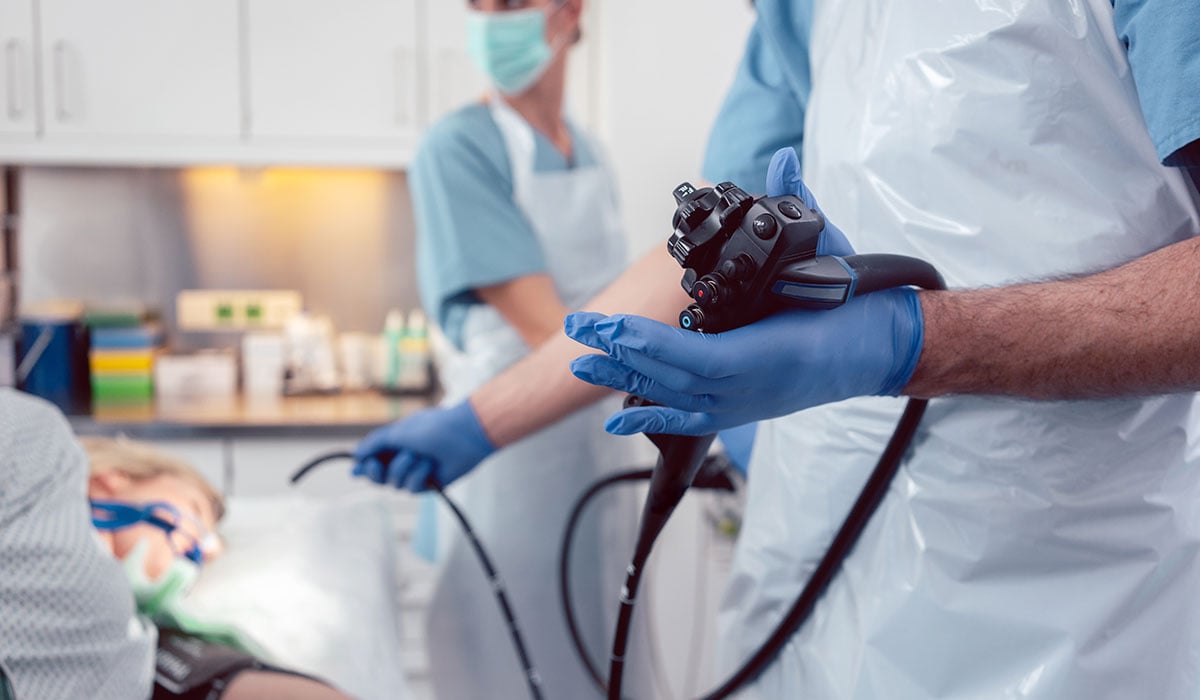Approximately 3 million Americans have some form of inflammatory bowel disease (IBD)—an illness defined by the Centers for Disease Control and Prevention (CDC) as “a term for two conditions (Crohn’s disease and ulcerative colitis) that are characterized by chronic inflammation of the gastrointestinal (GI) tract.” If left untreated, prolonged inflammation can result in major damage to the GI tract.
To prevent or treat IBD, it’s important to recognize the symptoms, learn the risk factors, and understand how it’s diagnosed.
Types
The two types of inflammatory bowel disease are:
Ulcerative Colitis
If patients have ulcerative colitis, they experience inflammation and sores along the lining of the large intestine (colon) and in the rectum. It’s estimated more than 750,000 Americans are affected by ulcerative colitis.
Crohn's Disease
Patients with Crohn’s disease can have inflammation along any area of the GI tract, ranging from the mouth to the anus. However, this condition most commonly affects the segment of the small intestine just before the large intestine. About 700,000 people in the United States are believed to have this disorder.
Symptoms
The major warning signs and symptoms of inflammatory bowel disease include:
- Persistent Diarrhea
- Rectal Bleeding or Bloody Stool
- Extreme Weight Loss
- Fatigue
- Reduced Appetite
- Abdominal Pain or Cramping
Risk Factors
Although IBD can impact all populations, there are groups who are at a greater risk. Most develop one of the conditions listed prior to reaching 30, however there are some that don’t until they hit 50 or 60. As is the case with many other diseases, having a close family relative with IBD can significantly increase your risk.
Causes
Although many previously believed diet and stress caused inflammatory bowel disease, the exact reasons remain unknown. Doctors hypothesize one is an immune system malfunction. According to nonprofit medical research institute Mayo Clinic, physicians speculate that “when your immune system tries to fight off an invading virus or bacterium, an abnormal immune response causes the immune system to attack the cells in the digestive tract, too.” Some believe genetics may also be an underlying cause.
Complications
Prolonged inflammation of the GI tract and untreated Crohn’s disease or ulcerative colitis can lead to several complications, including:
- Colon Cancer
- Skin, Eye & Joint Inflammation
- Primary Sclerosing Cholangitis
- Blood Clots
Crohn’s disease has its own list of complications such as:
- Bowel Obstructions
- Malnutrition
- Fistulas
- Anal Fissures
Ulcerative colitis complications may include:
- Toxic Megacolon
- Perforated Colon
- Severe Dehydration
Diagnosis
To diagnose inflammatory bowel disease, a physician may recommend several tests such as an endoscopy and/or colonoscopy. An endoscopy involves the insertion of a thin tube with a light and camera into the digestive tract. The physician will be able to see ulcers, bleeding, or other signs of IBD. During a colonoscopy, the doctor can view video images of the colon and rectum to examine for inflammation or ulcers. Additional diagnostic exams may include stool samples, blood tests, contrast radiography, MRIs, or CT scans.
Treatments
There are three major inflammatory bowel disease treatment options available: medications, surgery, and/or nutritional support. Depending on the severity of your condition, a doctor may prescribe one or more.
Medications
In most cases, IBD is treated with medications to reduce inflammation in the GI tract, resulting in fewer and less severe symptoms, and reduced risk of complications. For some, this can lead to long-term remission, as well.
Prescribed medications may include:
- Anti-Inflammatory Medications
- Immune System Suppressors
- Biologics
- Antibiotics
- Anti-Diarrhea Medications
- Vitamins & Supplements
Surgery
When IBD symptoms cannot be relieved with medications, nutrition support, or lifestyle changes, surgery may be necessary.
For ulcerative colitis, a surgeon will remove the colon and rectum, and insert an internal pouch attached to the anus in its place. For some patients, an internal bag isn’t possible, so an external bag will be attached to a permanent opening in the abdomen.
According to Mayo Clinic, two-thirds of people affected by Crohn’s disease will require at least one surgery in their lifetime. This typically involves the removal of sections of the digestive tract that have been damaged by inflammation. Then, the surgeon will reconnect healthy parts.
Prevention
Although there is no definitive way to prevent IBD, you can take several measures to reduce your risk:
- Eat a Healthy, Nutrient-Rich Diet
- Exercise Regularly
- Quit Smoking
- Manage Stress
To learn more about the preventative actions you and your loved ones can take against inflammatory bowel disease (IBD) or to schedule a colonoscopy, contact Gastroenterology Associates today.
Topics: Conditions












